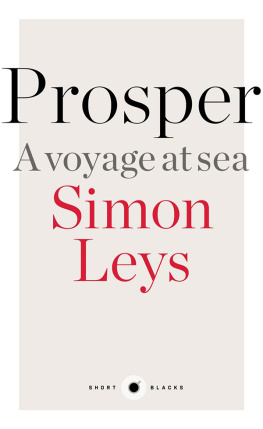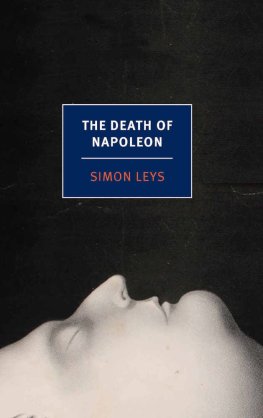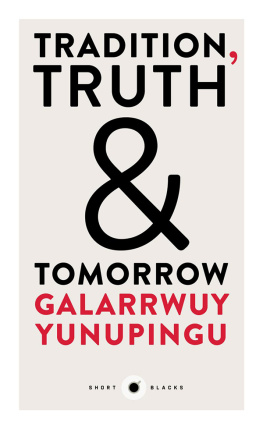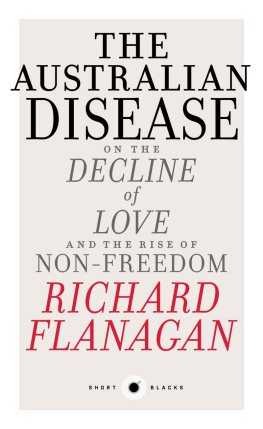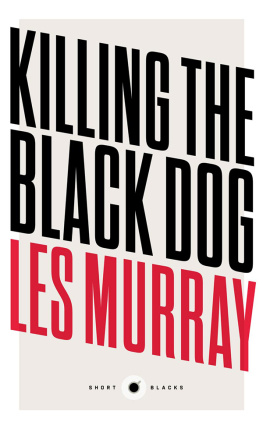SHORT BLACKS are gems of recent Australian writing brisk reads that quicken the pulse and stimulate the mind.
SHORT BLACKS
1 Richard Flanagan The Australian Disease:
On the decline of love and the rise of non-freedom
2 Karen Hitchcock Fat City
3 Noel Pearson The War of the Worlds
4 Helen Garner Regions of Thick-Ribbed Ice
5 John Birmingham
The Brave Ones: East Timor, 1999
6 Anna Krien Booze Territory
7 David Malouf The One Day
8 Simon Leys Prosper: A voyage at sea
9 Robert Manne
Julian Assange: The cypherpunk revolutionary
10 Les Murray Killing the Black Dog
11 Robyn Davidson No Fixed Address
12 Galarrwuy Yunupingu
Tradition, Truth and Tomorrow
Published by Black Inc.,
an imprint of Schwartz Publishing Pty Ltd
3739 Langridge Street
Collingwood VIC 3066 Australia
www.blackincbooks.com
Copyright Simon Leys 2005
Simon Leys asserts his right to be known as the author of this work.
First published in The Wreck of the Batavia & Prosper, Black Inc., 2005.
This edition published 2015.
ALL RIGHTS RESERVED.
No part of this publication may be reproduced, stored in a retrieval system, or transmitted in any form by any means electronic, mechanical, photocopying, recording or otherwise without the prior consent of the publishers.
National Library of Australia Cataloguing-in-Publication entry: Leys, Simon, 19352014, author.
Prosper : a voyage at sea / Simon Leys.
9781863957700 (paperback) 9781925203547 (ebook)
Short blacks; no.8.
Prosper (Fishing boat) Seamanship.
623.88
Cover and text design by Peter Long.
SIMON LEYS many books include The Hall of Uselessness, Chinese Shadows, The Death of Napoleon and Other Peoples Thoughts. He was a regular contributor to The New York Review of Books, Le Monde and Le Figaro Littraire.
When I was a student, during my last summer in Europe before I left for the Far East, I had an opportunity to join the crew of a tuna-fishing boat from Brittany one of the last boats working under sail.
Sorting out some papers recently, I came across the notes I had taken then some forty-five years ago about this experience of my youth.
The following narrative is based on these notes, but I have not modified their contents, for these memories are dear to me and they evoke a world that no longer exists.
B y train to Auray. It seems that true Brittany starts only now, as I leave the railway station and take the bus to Etel.
It is Assumption Day. The Breton women went to Mass this morning and will go back to church for Vespers in the afternoon, while their men spend the day in the cafs. The bus is full of women in long black skirts and white lace head-dresses. There are a few sailors wearing their Sunday best; a priest, built like a woodcutter, is reading his breviary. The bus has to stop on the way to allow a drunken sailor to piss on the side of the road. The women crack a few jokes spiced with rough peasant wit at his expense. First contact with the Breton drunks: I shall get to know them better later on. But why do the French say drunk as all Poland when they have Brittany so much closer to hand?
The road winds through verdant countryside, offering brief views whenever it reaches the top of a short, steep rise; but most of the time, green hedges and grey walls screen off the landscape and turn it into a maze of secret corners. Now and then I see stone villages with their slate roofs sitting tight under stunted trees. I have not been here before, but I feel almost at home.
*
In its heyday, Etel had a tuna-fishing fleet of nearly two hundred sailing boats yawls, ketches and cutters but these were progressively replaced by motor vessels, and now only two yawls remain: Prosper and toile de France.
I had been told that the owner-skipper of Prosper, Monsieur Pessel, sometimes agreed to take a passenger on board. He confirmed this to me by letter in the spring. His letter was short and rather non-committal. He simply suggested that I come and see him in the summer, between two mares.
When I arrive in Etel, the skipper, who has returned only a few days earlier, is playing boules with some friends. Seeing me, he seems annoyed and somewhat nonplussed. It is obvious that he has forgotten his vague promise (and, as I am to discover later on, he has already granted the same favour to another candidate). Most of all, he is keen to resume his game of boules. After hesitating briefly, he shrugs: All right, drop your bag on board. We leave the day after tomorrow. This mare will be long, probably a month. And with that, he turns back to his game.
*
Louis, a crewman from Prosper whom Id met earlier in the harbour, introduced me to the skipper. Now that I have been accepted, he offers to show me the boat. This takes time: our course is cunningly plotted to allow us to call in at all the cafs in town. There, with the compulsory glasses of rough red wine, are laid the foundations of a staunch friendship.
Louis has no family. Staying ashore is fatal for him; in port, he stops drinking only when he sinks into sleep. Since he has been doing this for years, he is never truly drunk just permanently soaked in drink. He is always blinking as if the light hurts his eyes. His head shakes. One expects him to fall asleep at any moment. He hardly eats: red wine for him is as milk to the babe. He floats in a state of universal benevolence, but in fact he is not fully present. His amiable semi-absence is in marked contrast to the rowdy boisterousness of his fellow crewmen. For instance, when one jokingly refers to the wife who left him, Louis responds with a tolerant half-smile but one feels that he detached himself from this business long ago.
However, he is a fine sailor, and in this he sums up the contradictions of the crew of Prosper. Very few fishermen are still willing to work under sail. This type of fishing is difficult, hazardous and less efficient. The skipper, therefore, can only recruit wrecks like Louis, or other men who can no longer sustain the relentless rhythm of work on the motor boats. Yet men who can handle sail are becoming rare, and in this respect Prospers crew belongs to a true elite the last group to maintain the traditions of what is a supreme form of seamanship.
This year, at the end of spring, when boats are prepared for the tuna season, Louis was almost prevented from embarking. At the Inscription maritimes compulsory medical inspection he was found physically unfit and duly rejected. This might have forced him into a vicious cycle: he can escape alcoholism only if he sails, but because of his alcoholism he is forbidden to go to sea. The skipper was in a quandary: first, because finding a replacement would not be easy; and second, because he was afraid of the consequences for Louis. The solution he finally found was to put Louis down on the crews list as passenger.
*
Right now, since toile de France is still at sea, Prosper is the only sailing boat in the harbour. At the quay, among the massive, ungainly pinasses, she alone belongs to another breed, like a stag among cattle. Low on the water, with her long, slender hull, her tall main-mast surging out of an ordered mess of stays, shrouds and halyards, she cuts an impressive figure. An experts eye would trace her to the Camaret boatyard, where she was born twenty years ago. The line and slimness of her stern-post clearly signal her origins and make her, despite her size and weight, a boat as fast and as responsive to the helm as a yacht. The deck is completely clear to allow room for manoeuvring, and there are only two hatchways: one before the mast, providing access to the fish and sail holds, and one just forard of the helm, leading to the quarters.
Next page
